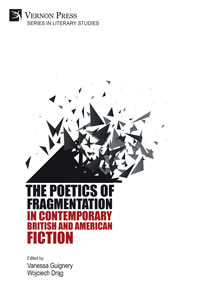"A dominant but deeply undertheorized feature of serious contemporary writing is its fragmentary nature. This book powerfully, intelligently, and rigorously fills that lack (lack being, of course, what fragmentation is forever exploring)." David Shields, Pr. at the Univ.of Washington.
 The Poetics of Fragmentation in Contemporary British and American Fiction
The Poetics of Fragmentation in Contemporary British and American Fiction
By Vanessa Guignery and Wojciech Drąg, eds.
Wilmington, DE: Vernon Press, 2019.
ISBN: 978-1-62273-616-4
The authors
Vanessa Guignery is Professor of Contemporary English and Postcolonial Literature at École normale supérieure de Lyon. She published The Fiction of Julian Barnes (2006) and Conversations with Julian Barnes (co-edited with Ryan Roberts, 2009). She is the author of Seeing and Being: Ben Okri’s The Famished Road (2012) as well as monographs on B.S. Johnson (2009) and Jonathan Coe (2015). She is the editor of several books on contemporary literature in English, including a collection of interviews with eight contemporary writers, Novelists in the New Millennium (2012) and The B.S. Johnson – Zulfikar Ghose Correspondence (2015).
Wojciech Drąg is Assistant Professor at the Institute of English Studies, University of Wrocław. He is the author of Revisiting Loss: Memory, Trauma and Nostalgia in the Novels of Kazuo Ishiguro (2014) and co-editor of War and Words: Representations of Military Conflict in Literature and the Media (2015) and Spectrum of Emotions: From Love to Grief (2016). In 2018, he received The Kosciuszko Foundation fellowship at the University of Utah.
Summary
The last decades have seen a revival of fragmentation in British and American works of fiction that deny linearity, coherence and continuity in favour of disruption, gaps and fissures. Authors such as Ali Smith, David Mitchell and David Shields have sought new ways of representing our global, media-saturated contemporary experience which differ from
modernist and postmodernist experimentations from which the writers nevertheless draw inspiration. This volume aims to investigate some of the most important contributions to fragmentary literature from British and American writers since the 1990s, with a particular emphasis on texts released in the twenty-first century. The chapters within examine whether contemporary forms of literary fragmentation constitute a return to the modernist episteme or the fragmented literature of exhaustion of the 1960s, mark a continuity with postmodernist aesthetics or signal a deviation from past models and an attempt to reflect today’s accelerated culture of social media and over-communication.
Contributors theorise and classify literary fragments, examine the relationship between fragmentation and the Zeitgeist (influenced by globalisation, media saturation and social networks), analyse the mechanics of multimodal and multimedial fictions, and consider the capacity of literary fragmentation to represent personal or collective trauma and to address ethical concerns. They also investigate the ways in which the architecture of the printed book is destabilised and how
aesthetic processes involving fragmentation, bricolage and/or collage raise ontological, ethical and epistemological questions about the globalised contemporary world we live in and its relation to the self and the other. Besides the aforementioned authors, the volume makes reference to the works of J. G. Ballard, Julian Barnes, Mark Z. Danielewski, David Markson, Jonathan Safran Foer, David Foster Wallace, Jeanette Winterson and several others.






